Movie Review – Saving Mr Banks
– Summary –
Director : John Lee Hancock
Year Of Release : 2013
Principal Cast : Emma Thompson, Tom Hanks, Colin Farrell, Ruth Wilson, Bradley Whitfield, Paul Giamatti, Rachel Griffiths, Jason Schwartzmann, BJ Novak, Annie Rose Buckley, Kathy Baker, Rachel Griffiths, Ronan Vibert.
Approx Running Time : 130 Minutes
Synopsis: Walt Disney, intent on capturing the rights to the highly successful book Mary Poppins, woos its embittered author, PL Travers, in a series of two week production meetings in the Disney Studios, Los Angeles.
What we think : Charming, delightful dramatic work for the enigmatic Thompson, and the looks-effortless Hanks, about the machinations of bringing Mary Poppins to the big screen. The film’s flashback sequences bring Travers’ tragic back-story to the fore, and gives the film tremendous weight as we get to know this ostensibly irascible British woman. A winner in almost every respect.
**********************
A spoonful of sugar.
Disney’s Mary Poppins is a film which has withstood the test of time – it is one of a handful of movies one can rightly call “classic”, and have that appellation actually mean something. Saving Mr Banks, while never really aiming for, let alone achieving, a similar level of acclaim, successfully attempts to capture the magic of Poppins generational-hopping love by examining the gestation of the perennial favorite. It’s a movie about a movie, one of those self-congratulatory Hollywood love-letters to itself that invariable feels forced, but here manages to remain involving and accessible to anyone watching. Especially if you’ve seen Mary Poppins. Familiarity with the Poppins film isn’t a prerequisite, although anyone watching this film is likely to be in the demographic who have seen the Julie Andrews favorite, so it’s almost a given that if you’ve ever wondered about chimneys, flown a kite, jumped into a chalk drawing or laughed your way up to the ceiling, you’ll find Saving Mr Banks a film to savor.
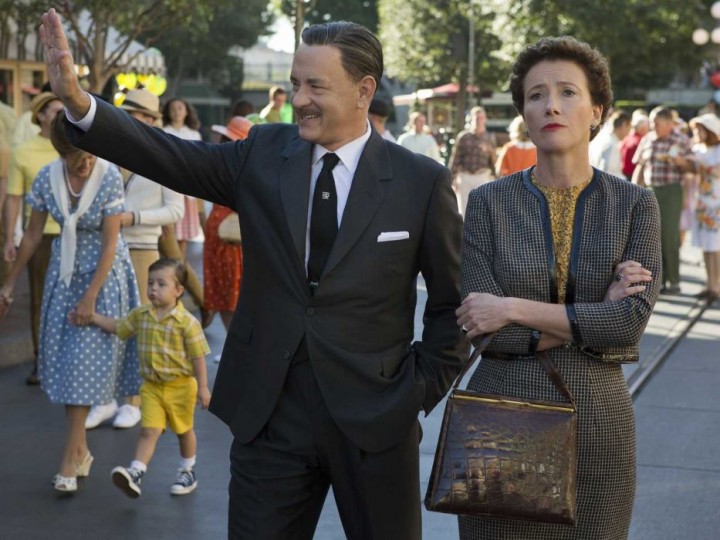
Walt Disney (Tom Hanks) has spend almost 2 decades trying to attain the film rights to beloved children’s book Mary Poppins, written by British author PL Travers (Emma Thompson). After yet another refusal by Travers, Disney invites her to Los Angeles to sit in on a number of production meetings in order to ensure any potential film project is given her stamp of approval – problem is, Travers is so demanding, so frustratingly unbending to Disney’s wishes for the movie, she continues to refuse to grant him the rights. As Travers spends time in California, however, and her memories of her mother (Ruth Wilson) and alcoholic father (Colin Farrell), and his fall from grace are given fresh light, Travers is forced to confront the greatest fear she has: that Disney will transform her deeply personal creative fiction into a sugary, piffling work of middling inconsequential fluff. Working with Poppins screenwriter Don DeGradi (Bradley Whitford), and composer Robert and Richard Sherman (BJ Novak and Jason Schwartzmann respectively), and befriending her chauffeur Ralph (Paul Giamatti), Travers navigates the perils of Hollywood film-making as well as being thoroughly outside her comfort zone, and coming to an epiphany about her life lived in the Poppins shadow.
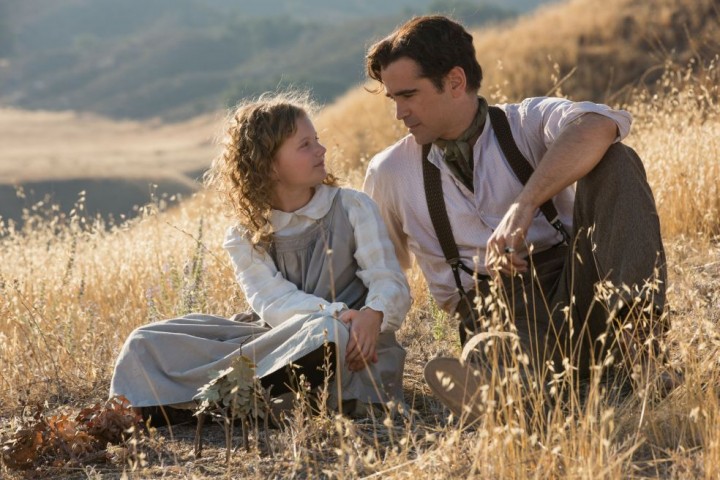
Saving Mr Banks is a film of two distinct tones. The first, a dramatic, moving historical familial recollection, seems thoroughly un-Disney, since it involves PL Traver’s father drinking his way to an early grave. The second, the main thrust of the narrative, sees Travers arrive in LA and find herself in a deadlock with Walt himself over the creation of the cinematic Poppins. Both elements of the film are totally disparate – the young Traver’s life on an Australian farm seems a world away from the stuffy, rude British author who rips apart anyone daring to come into her presence, but in this film it works wonderfully. Farrell, as Traver’s father, is gracefully destructive, opposite Annie Rose Buckley as a young Travers (affectionately named “Ginty” by her dad) who all but steals the show as the soulful young girl who would use her life experiences to create one of literature’s greatest nannies. It’s this personal journey that makes Poppins such a valued commodity for Travers, who equates a lot of the Poppins story to her father, mother, aunt (Rachel Griffiths, in an iconic and understated role), and understandably resists the Disney sway.
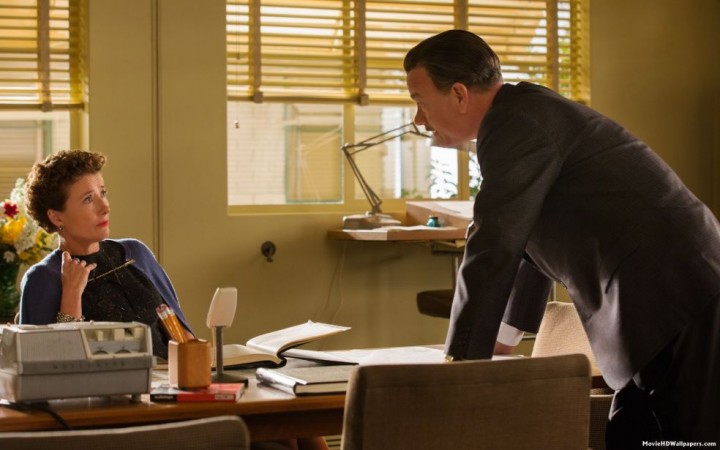
Kelly Marcel and Sue Smith have written a terrific script, a script which seems to straddle the underlying tragedy of Travers’ childhood with the more comedic Disney/Travers battles with ease. Neither elements overpower the other, although if I was to pick one, the Young Travers’ story hit more emotional resonance with me, since it involved an innocence removed through tragedy. That’s not to say Emma Thompson and Tom Hanks are shortchanged in any way, because they most definitely are not (Hanks has a monologue late in the film that rivals a lot of his best dramatic work); this is undeniably Thompson’s film, and she owns the role of Travers outright. Drawn from recordings of Travers’ meetings at the Disney studios (one of which is played over the closing credits, which shows just how accurate Thompson’s portrayal actually is), PL Travers was infamously crusty and demanding with her creation, a fierce protective instinct driven from the aforementioned childhood tragedy that Thompson manages to deliver through the gradual breakdown of the frigid, ice-cold exterior Travers’ fronts up. Travers is a horrid woman, truly one of those people you’d throw a knife into the back were you to ever meet them in person, yet over the course of the film, layered in with explanatory back-story, we come to enjoy her, to appreciate why she is the way she is, and actually admire her. This journey is worth the price of admission alone.
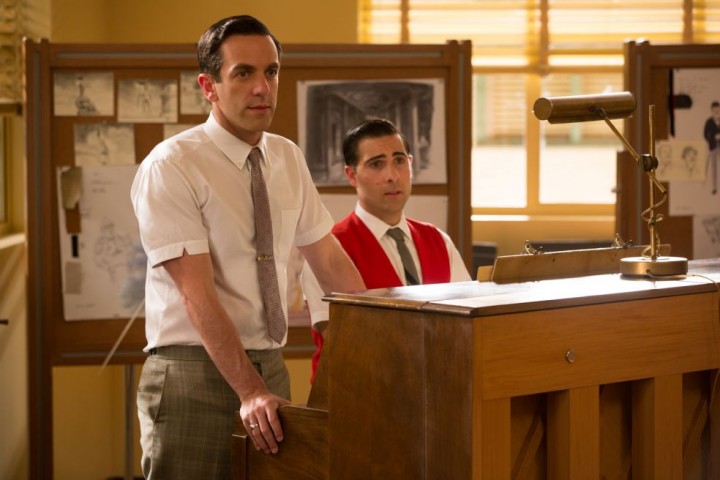
Tom Hanks has a rather smallish role than I’d expected, considering he’s portraying one of the giants of American entertainment in Uncle Walt himself. Hanks is effortless though (in fact, both he and Thompson shouldn’t be surprised to find more Oscar nominations on their shelves for their work here) as Disney, offering that warm charm the man gave off so well. Thompson delivers yet another career defining role, turning a thoroughly unlikeable woman into one of steely nerve and strength, who ends up garnering our respect and – dare I say it – love. Colin Farrell is terrific as Travers’ father, who inspires her imagination with alcohol-infused games and fun, before succumbing to the drink and spiraling into a consumptive death way too early. Small roles to Paul Giamatti, as Travers’ American chauffeur, and Disney-studio stars in Bradley Whitford and Jason Schwartzmann infuse this sepia-tinted love-letter to Disney’s magnificent opus with depth and warmth, the subtle humor and lack of snark a truly breathtaking triumph of screenwriting. But the breakout performance is Annie Rose Buckley, as a young Travers, trying desperately to understand her father’s all-too-human failings, and her mothers’ inability to cope. Buckley isn’t given a lot of chance to flex her range, spending most of the film reacting rather than enacting, but she has an innocence and freshness that’s captivating each time she’s on screen. Ruth Wilson, who appeared in The Lone Ranger alongside Armie Hammer, is underwritten as Travers’ mother, who cannot handle the isolation of outback Australian living as well as an alcoholic husband; she does her best, but the role is thinly developed.
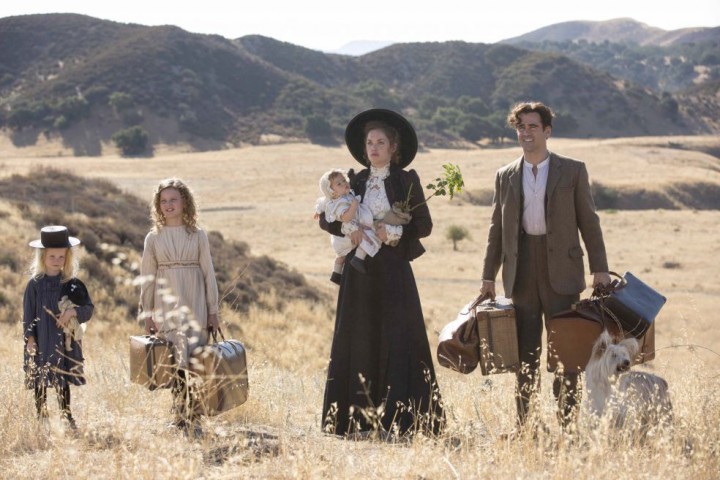
As a lover of film, the most enjoyable aspect (for me) was seeing the creation of one of my childhood favorite films, Mary Poppins. This glimpse, short as it is, of the production of a cinema classic, is just lovely, a truly delightful journey down memory lane with iconic tunes and sly jokes. The production value on this film is wonderfully period, with vintage Disney memorabilia making itself seen through one of Disney’s more effusive welcome gifts to Travers, as well as a terrific glimpse into what working at the Disney studio must have been like during this enormously creative period in its history. As expected, the film is filled with plenty of Poppins’ magnificent songs, paralleling the troubled childhood the author had, and elevating the film several notches with a vague sense of sentimental warmth; while I’d hate to credit Thomas Newman for his work here considering a large amount of it is based on the Sherman brothers’ work, there’s an elegant accompaniment to Newman’s material that matches the Poppins’ iconic themes.
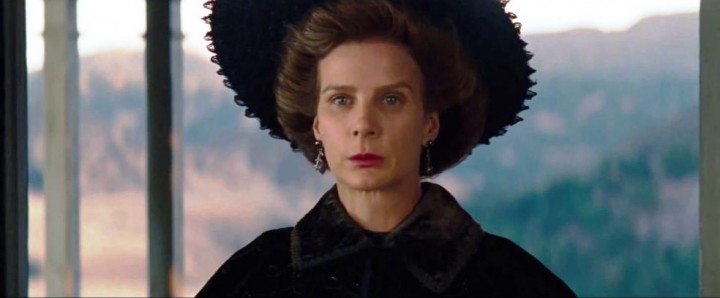
Coupled with a flawless cast, there’s little to dislike about this wonderful, lovely film. If it doesn’t work for you, if you don’t find a part of this film at least a little moving, then you might just be a little bit dead inside. Thompson is superb, Hanks is great, Farrell delivers in a difficult role, and Annie Rose Buckley is destined for big things; Saving Mr Banks might not be a sequel to Mary Poppins, but as a callback to that films’ magnificence, this one is terrific.


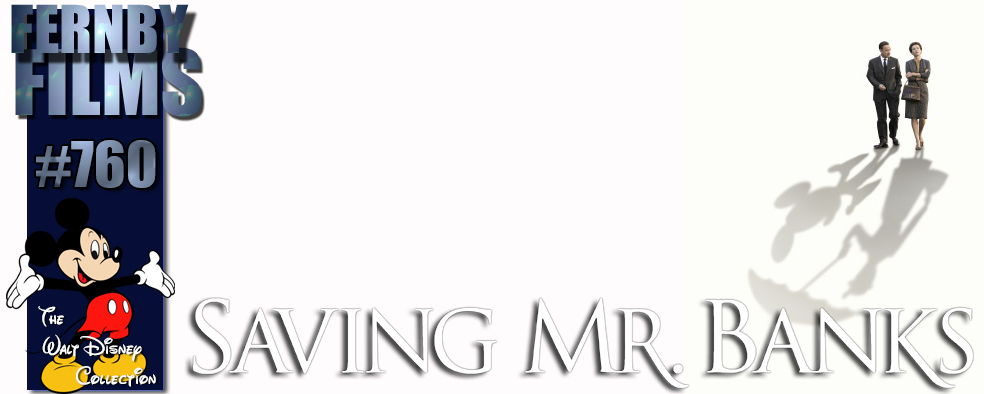








 Film Review: Saving Mr Banks
Film Review: Saving Mr Banks
Voice your opinion!!! Who is the better actor in Saving Mr Banks??
[polldaddy 7827725 http://answers.polldaddy.com/poll/7827725/ polldaddy]
This movie was much better than I had expected it to be. I thought it would be completely white-washed since it came from Disney Studios. However, they did a really god job making it truly engageable. Nice review, too.
My recent post Worst. Olympics. Ever.
Thanks man, glad you enjoyed the review. I agree, I expected a more sanitized film than what they delivered – to their credit – especially with Travers' father drinking so much, which was portrayed with a fairly brutal tone, considering this is Disney we're talking about; this may have gone some way to giving this film more depth and emotional resonance than it would have otherwise.
I quite enjoyed this one Rodney. The father/daughter relationship really got me tearing up, Colin Farrell is pretty good here but my fave scenes are the ones between Thompson and Giamatti. Hanks is ok as Disney though he's still pretty much Tom Hanks to me, he didn't *disappear* much into his character.
My recent post Rental Picks: Get the Gringo & The Lone Ranger
I get what you're saying, Ruth, and I agree with you to a point. I don't think anyone could have really done Walt any "more" without it becoming a parody or caricature, and I think Hanks did well not to overplay it. Perhaps he was playing it too safe, though. Giamatti's role was one of the more interesting ones in the film, which is bizarre considering how little he's on the screen, but I would have like to see more of them together bonding. Thanks for popping in, Ruth!!
Nice review Rod. Though I hate to admit it now, the movie got me tearing-up when I least expected it and I think that deserves credit.
My recent post Pompeii (2014)
I'll happily admit to a small bit of water around the eyes, Dan. No shame in that.
Or is there……? BWAA AHAAA HAAAA!!!! :$